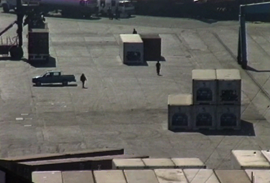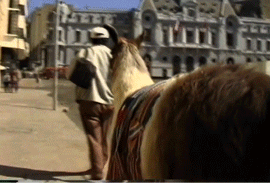DOKU.ARTS
Zeughauskino Berlin
19.09.–14.10.2012

O Castelo Resiste, O Livro de Raul
O Castelo Resiste documents a conversation with Chilean filmmaker Raul Ruiz. He talks about manipulation, hyperthyroidism, Giordano Bruno, sacrifices, dreams, simulators, tunnels and souls, and the transformation of the massacre in landscape. Shot in Rio de Janeiro, in Arthur Omar’s home, while both directors were watching TV.
Documental allegory O Livro de Raul is a trip to Chile with Raul Ruiz. Conversations and adventures take movies as a point of departure, passage and point of arrival. Includes scenes shot in Free City, near Ritoque, Chile, an utopian community of architects and artists revolving around the idea of the “poetical act” as the necessary substratum to any construction. The film responds to the architect’s attitude: “It is said that: ‘traditional architecture begins with the purity of a plan, immediately establishing the limits. On the contrary, we always begin from the center, from the inner void of a space, expanding our activities to the borders, but never touching them. Our work is always unfinished’. A film should be as simple as switching lanes on a highway”. (Arthur Omar)

Arthur Omar
Arthur Omar is one of the most eclectic artists and experimental filmmakers in Brazil. Since the 1970s he has developed new methods of visual anthropology in his documentaries, photography, texts and video installations. The New York Museum of Modern Art held a retrospective dedicated to his films and videos in 1999. Arthur Omar participated twice at the Biennale in São Paulo. His film Triste Trópico (1974) is considered to be one of the classics of Brazilian cinema. Omar has published several books about photography and theory, among them Antropologia da Face gloriosa (1997), O Esplendor dos Contrários (2002) and Viagem ao Afeganistão (2010, with a foreword by Antonio Negri).
